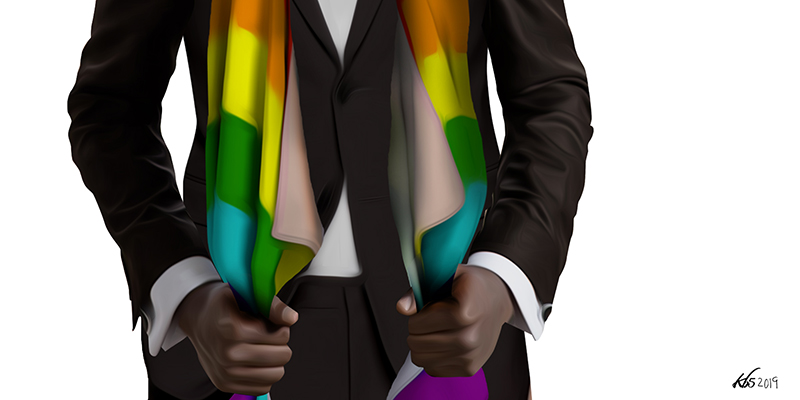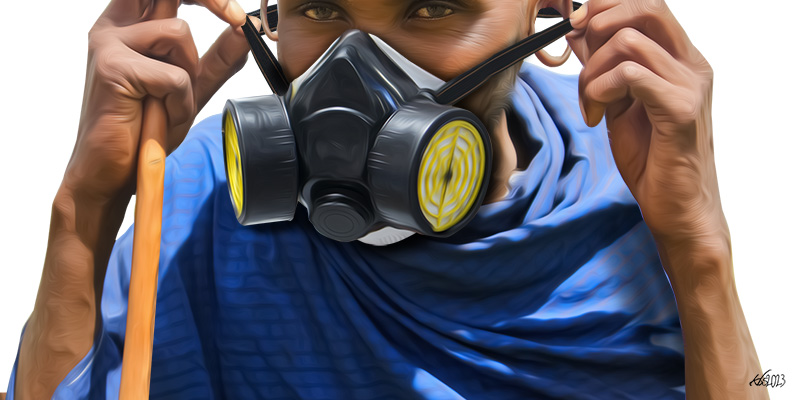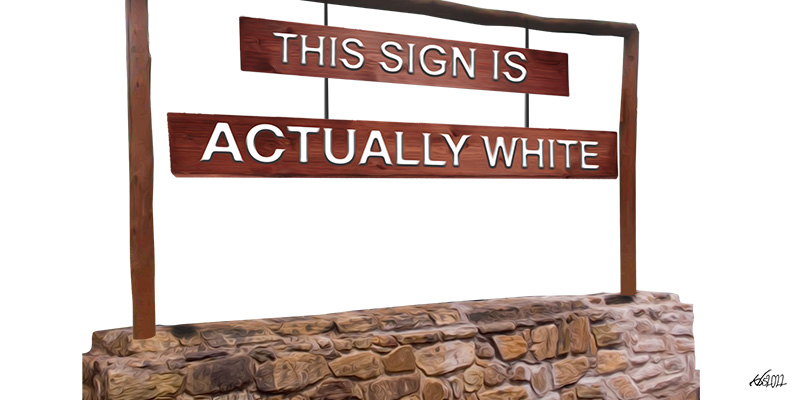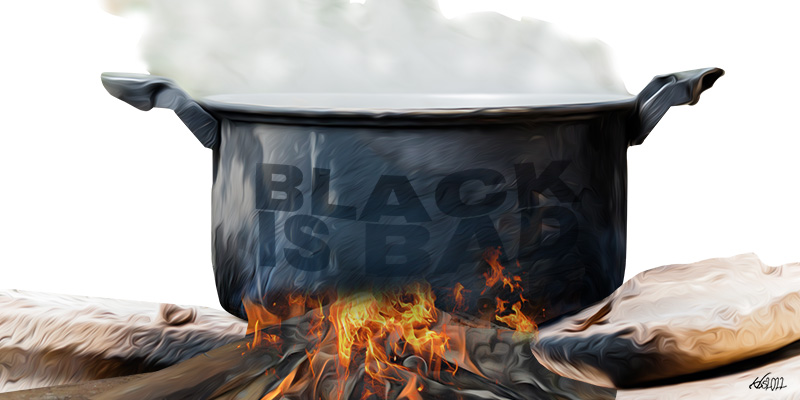Kariuki* hustled his way through Nairobi as a personal trainer, masseur and occasionally sold sportswear. Then COVID-19 happened. His income stream went down to zero. He got tired of begging friends and former clients for 500 bob here, a thousand bob there, decided to sell off what he could and went back to his parent’s farm in the country’s central region. This young, handsome, muscle-in-all-the-right-places, rangi ya chocolate, ambitious gay man, needed to live, and for that, he needed to eat. Nairobi had stopped feeding him. He was one of the many LGBTIQ individuals who found themselves going back to homes that had either forced them out or that they had fled.
Kariuki had left home soon after university and since then visits to shags were to his grandmother with whom he had a strong relationship. But it was not home. To be accepted back he had to renounce his gay ways, which he did. Kariuki was put through a traditional cleansing ceremony to chase the gay away, after which the “prodigal” was welcomed back to the fold. His parents gave him an acre of land and promised him another five if he stayed on the straight and narrow. Every pun is intended.
Kariuki started poultry farming, and he was surprised at how well he took to it; he started seeing a future for himself back on the land. Unbeknown to his parents, Kariuki is still actively living his gay life. He acknowledges that if going back into the closet and being on the “down-low” was what he needed to do keep hunger at bay and get him back his inheritance, so be it. I now had a gay friend who was a poultry farmer.
You see, I had resigned myself to believing that agriculture wasn’t really for us. Us being queer people, and I bet I’m not alone in thinking like this. Many queer individuals don’t see a future for themselves in agriculture. It is not within reach of our imagination. Young queer folk find security, freedom, opportunity, visibility and invisibility in urban settings. Plus, there is also greater access to health services that target LGBTIQ people and, more than anything, there is access to our community. Agriculture, the mainstay of our Kenyan economy, isn’t within our rainbow reality. Yet, it can be.
Kariuki was put through a traditional cleansing ceremony to chase the gay away, after which the “prodigal” was welcomed back to the fold.
Kariuki was “lucky” that he could go back home, and that there was farmland that he could access. Plus, he was “not so obviously gay”. But what if how you present yourself in public doesn’t fit in the box that family or society wants you in? Are you still able to easily access services without fear of discrimination? Are you able to access land or even food without having to look over your shoulder?
Over the past year, the COVID-19 pandemic has upturned Kenya and the world. A friend of mine opted to move back to her rural area when the initial restrictions were announced. The reason for this migration was that she was unsure she’d be able to provide food for her children in a town that she had no affiliation to, where she had no kin she could turn to in case she was too broke to buy food or if there were any food shortages.
The song Mzee Kasema Rudi Mashambani by Equator Sounds came out during Jomo Kenyatta’s presidency and was a rallying call for Kenyans to go back to tilling the land. Many years later, this land, which is such an emotive and sensitive subject in Kenya, is not equitably accessible to Kenyans. And if you have come out publicly as queer, then access to this land becomes even more complicated if you want it. Turudi wapi, kama tumefukuzwa?
Wanja Mugongo has always loved farming. Her mother, who was the principal’s secretary at a Nyeri college, seeded that love for the soil. Mugongo’s mother was allowed to farm on the college land, and this supplemented her meagre earnings. She supplied the college with maize, potatoes, carrots and cabbages. Mama Wanja banked on land and therefore invested in it whenever she could. Wanja inherited this astute perspective, and despite the many years spent in LGBTIQ activism, she never forgot that she had green fingers and never lost her love for the soil.
“Farming was my place of joy, and I knew that was what I wanted to do when I was out of employment. I didn’t want to retire and then farm for a living; I wanted to retire and farm for pleasure,” she states.
Mugongo was fortunate that she did not have to go to bank for a loan, that the land was hers. As I researched this article, I came across a number of LGBTIQ farmers who have accessed family land only because they have buried their sexuality.
Apollo* is married with children and lives in Bondo, Siaya County. He is an activist and farmer. The activist side of his life is only known to those who need to know. Apollo recognises that he would have been disinherited had he gone public about his sexuality. He informs me of a young man who has kicked off the family land after the family discovered he was gay. This young man was fortunate that a relative was kind enough to give him a small patch on which to build a house for himself, but he was denied his right to the family land. Apollo is grateful that he was spared such an ordeal.
“You know, for some of us, this is the life we have chosen for ourselves and it is how things are done here for many of us. Things would have been very different for us,” says Apollo. “Very different” in this case probably means poor, landless, ostracised and maybe banished.
Wichlum Beach on the Kenyan shores of Lake Victoria is home to the Light Youth Group (LYG). The group works with members of the LGBTIQ community in that area. It has 15 members, but within its sphere of operation, it reaches close to 300 Men who have Sex with Men (MSM). Many bisexual and gay individuals are also affiliated to the group.
Economic empowerment is one of LYG’s thematic areas, and being in a rural setting, the group is using agriculture and fishing to improve the economic status of its members. . The group is trying to lease three acres of land for farming activities; they were evicted from the land on which they were carrying out their activities when the owner discovered that LYG was a queer organisation. Once beaten twice shy, so this time round, LYG has come out clean with the prospective landlady who, fortunately, is not prejudiced against the community. Accessing capital to pay for the new piece of land is the next hurdle they need to overcome. Expectations are high, but patience is needed.
Each member of the group is allocated a 50m by 60m plot of land on which to grow horticultural produce — sukuma wiki (collard greens), cabbages, onions, watermelons, etc. — which is sold to the surrounding community. By selling to the community, the group hopes to build bridges and expects that the local residents will see them as active members of the society. The project’s beneficiaries are drawn from both within and outside the Wichlum area; many have been disowned by their families because of their sexuality. The project offers an opportunity to a marginalised group of people who would otherwise have no access to land nor means to some form of livelihood.
Odhiambo* says he became a farmer by accident and has been farming in Ukwala, Siaya County, for the last three years on family land that he inherited after his mother passed away. He says he is lucky as he and his siblings have a “your life is your business” approach to life and so Odhiambo, who is in his early 40s, doesn’t have to justify his unmarried status. His neighbours have tried to pressure him into settling down, but he informs me that he has warned them against meddling in his business.
“If my late mother didn’t pressurise me into getting married, who are they?” he asks rhetorically. “I’ve managed to build a life for myself here, and my business should be the least of their concern.”
American civil rights activist, the late Dr Martin Luther King III, states, “Because no matter who we are or where we come from, we’re all entitled to the basic human rights of clean air to breathe, clean water to drink, and healthy land to call home.” Unfortunately, many individuals have to keep their sexual orientation private just to access their birthright. But we as a nation should strive to ensure that one’s tribe, gender, sexual orientation, politics or faith is not an impediment to accessing the fruits of this land. It is a right enshrined in our Constitution that we as queer Kenyans should demand.
The country’s agricultural sector is the backbone of the economy, contributing approximately 33 per cent of Kenya’s GDP and employing more than 40 per cent of the total population and 70 per cent of the rural population. By shutting out queer individuals from the farms, fields, lakes, rivers and the sea, we deny the country more food, income, taxes, producers, employers and investors.
In 2020, the Mombasa-based LBGTIQ group, PEMA Kenya, gave over 100 of its members who live in various neighbourhoods within and around the city, training in poultry farming to enhance food security and provide them with skills to earn an income. Such schemes, if successful, could be a way of better integrating queer folk into their communities and creating safe and queer-friendly spaces in which to live. Another group in Kitengela has opted to go back to the soil to produce healthy food for its members living with HIV/AIDS. This approach to ensuring food security and nutrition for vulnerable groups is innovative, practical and has impact.
“Because no matter who we are or where we come from, we’re all entitled to the basic human rights of clean air to breathe, clean water to drink, and healthy land to call home.”
Urban farming should be supported as it could be a source of livelihood for the many young people who find themselves in the big cities and towns. And although access to land in urban areas comes at a premium or with terms and conditions that are difficult to comply with, urban gardening does not require vast amounts of space. Sack gardens can produce leafy greens like sukuma wiki, spinach, and traditional vegetables on as little as one square metre. There are lessons to be learnt from organisations like PEMA and what they are doing in building a pool of queer poultry farmers in urban areas. Their members can reap the benefits of both worlds — access to urban energies and to their chosen family, and the advantages of being food producers.
“Farming is not a get-rich-quick way of making money. If you have money pressures, it is hard to get into farming,” cautions Mugongo. “If you don’t know the soil, you will need time to understand the soil and its ways. You need time and money. Are queer people even considered bankable?”
Access to credit or capital is a huge deterrent for many queer individuals who would like to go into business or agriculture. Emerging Marginalized Communities (EMAC-Kenya) has established a system for its members that gets around the credit and capital hurdle. The organisation has set up a poultry farming facility and a greenhouse on the grounds of their offices, roughly the size of three-quarters of a football pitch. This pilot agri-business project supports seven queer men and two commercial sex workers who buy the produce on credit, for resale to consumers. EMAC-Kenya recoups its funds by deducting a specific amount when a member buys new stock from them. The organisation’s director informed me that the long-term goal is to create agri-businesses that can offer employment opportunities for other queer individuals; learning of this vision warmed my heart.
Bringing agriculture within reach of the imagination of queer youth might help prevent them from adopting precarious ways of earning a living. The queer community needs to be brought into the agricultural conversation and ways need to be found to support minority groups to earn a living within this sector that the country relies so heavily on.
There need to be discussions on how to make the sector more diverse, inclusive and innovative. Being a farmer, animal breeder, fisherman, rancher should be seen as a career option and not as a Plan D, to be adopted after all else has failed. Mugongo notes that the agricultural sector needs to be drastically transformed, and perceptions on agriculture need to change to make the sector attractive and within reach of the imagination of all youth, not just queer youth.
Unfortunately, there are those within the LGBTIQ community who dropped out of school or completed high school with poor grades. They have few employable skills, and when they do have them, the sectors in which they can work safely and freely are limited. The hustle is real, very real for them. The hospitality sector, entertainment, retail, personal care and grooming — the sectors in which many queer individuals have found work — have been severely impacted by the pandemic. If you don’t work, you can’t afford to eat, and many have been struggling to eat.
The one key attribute we must first remember about queer Kenyans is that we are Kenyans too. The fight for queer rights in the country is about giving us the same access as other Kenyans to the constitutional rights that are promised to us all as citizens of this land. This land that we prize so much that we have even killed one another over, that we go to whatever lengths to acquire, that feeds us all. This our soil doesn’t know our tribe, gender, faith, sexual orientation or class; all it knows is that it is meant to produce and feed.
It is time to start queering agriculture, and it is time to make sure that no one, be they queer or even differently-abled, is left out of this conversation. There are opportunities galore that we haven’t even begun to explore, and it is time to rejig and rethink a sector that feeds all Kenyans, for there is plenty to be found within our borders.
*Names have been changed.








